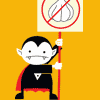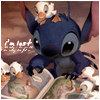The future imperfect
Scott Westerfeld’s Uglies series touches the fears of today’s teenagers with surgical precision. Amanda Craig meets him
by Scott Westerfield
JUST WEEKS AFTER A hospital was given permission to perform Britain’s first full-face transplant, Scott Westerfeld’s Uglies trilogy has struck a huge chord — not least with Twentieth Century Fox, which has bought the film rights.
The American author has written what amounts to a Brave New World for our time in his dystopian thrillers set 300 years in the future, when teenagers believe themselves ugly until, at 16, they have mandatory plastic surgery.
As well as getting the latest eyes, noses, bodies and bones, however, they secretly get brain surgery that turns them into passive party creatures, controlled and coerced by an elite of secret police. Westerfeld, a prize-winning author of sci-fi, is the Next Big Thing for teenagers, who can’t wait for the third instalment, Specials, published this week.
The first novel, Uglies, came out this year and quickly became the hottest of hot reads, selling by word of mouth. So many teenagers’ anxieties — how they look, how little freedom they really have and how demonised they feel by society — seem to be dramatised in these books.
“Tally, the heroine, lives in a world that is truly post-feminist, and in which other issues, such as race and class, have been got rid of. What interested me was, initially, writing about the way we see pretty people as better. We all agree that it’s bad to judge people on skin colour, but we’re unapologetic about admiring beauty, with the result that pretty people get better jobs, grades and are even arrested less,” says the author, who is wryly amused by having become one of the people The New York Times likes to ask for quotes every time questions on plastic surgery are raised.
“I wouldn’t hesitate if I had a kid with a port-wine stain. We’ve all been altering our appearances ever since clothing was invented. But at some point, having the right face will be like having the right handbag. It’s treating as trivial and fashionable something you can die having done.”
Plastic surgery is not just a Western obsession, according to his research. It’s huge in China and Thailand, and Uglies opens with a New York Times quote from Yang Yuan, a Chinese beauty contestant whose looks were “enhanced” by surgery, asking: “Is it not good to make society full of beautiful people?” “The Chinese even have a TV beauty contest for the ‘most improved’,” he says. He sees this literal loss of face as a loss of culture, akin to the books destroyed in Ray Bradbury’s Fahrenheit 451, and tells a story about a friend with a big nose who begged for plastic surgery as a teenager but was talked out of it. “Everyone who sees her now says that with a small nose she’d be cute, but with her big one she’s gorgeous. I’ ve had several letters from girls who say they have decided against surgery since reading Uglies. If I can save just one nose . . .”
Westerfeld loves exploring ideas about perception and freedom: he wrote his first novel, Polymorph, about a shape-shifter who can be male-female, black-white in 1996, when working as a non-fiction editor for the publishers McGraw Hill. His novels stood out for being both remarkably well written and astringently original.
He grew up at a time when people believed sci-fi was all going to be about rockets and giant computers. In the world of Uglies, however, our large, energy-guzzling technologies have been replaced by minute, stylish devices. Such technology is already with us, with teenagers in California being monitored by their cellphones or even dental implants. It is his prescient perception that such inventions will lead to absolute loss of privacy.
“Skateboards were made illegal in Texas because they encouraged teenagers to congregate,” Westerfeld says (he took pleasure in reintroducing skateboards in Uglies as hoverboards, which can fly through the air). “Adults react to teenagers as they do to dogs — you know, two are cute, five are scary and twenty a riot. Everything they do is criminalised. Yet it’s the age when people are most creative, instead of just sucking in facts. It’s such an intense time of life, which makes it fraught for everyone in every way. But that’s why I love writing about it.”
Tally, who has to postpone her “surge” into Prettydom to spy on the rebels living in the Wild, inconveniently falls in love and is forced to rethink her ideas of beauty. A pleasingly selfish protagonist whose considerable flaws help her to fight back against mind-bending, her story is chock-full of action and adventure, but also of a more subtle moral growth that turns her into a true heroine.
As the younger brother of two sisters, and husband of a distinguished Australian fantasy writer, Justine Larbalestier, Westerfeld is so tuned-in to the way that women think and feel that the series crosses gender, too. His website shows school art projects inspired by Uglies, including board games, hoverboards and even cakes.
That it is children’s authors rather than adult ones who address the big questions about the way we live now is beyond question, but few have captured the Zeitgeist quite like Scott Westerfeld.
So I just finished the third book in the Uglies Trilogy by Scott Westerfeld, Specials. It was amazing. And naturally, me having no life and therfore nothing to do at 11:00 on a Friday night, I looked at his blog. www.scottwesterfeld.com/blog/ And when I found a link to this article I just couldn't help posting it. I also found some big news on his blog:
1.) As mentioned above, Uglies is being made into a movie by Twentieth Century Fox!
2.) Scott has said that there's going to be a fourth book! Its going to be called Extras and is set to come out October 2007. Although its set in the same setting as Uglies it unfortunately doesnt have Tally as a main character.





















































No comments:
Post a Comment